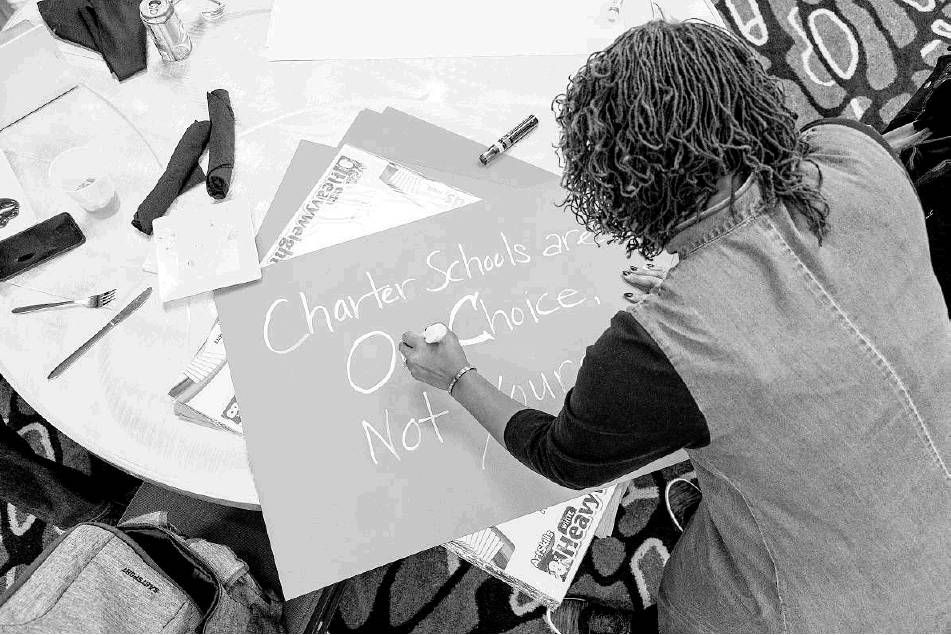Minorities chafe as Dems abandon charters
Racial gap widening on alternate option to public schools
By Erica L. Green and Eliza Shapiro NEW YORK TIMES
ATLANTA — The night before Democratic presidential candidates took to a debate stage here last week, black and Latino charter school parents and supporters gathered in a bland hotel conference room nearby to make signs they hoped would get the politicians’ attention.
“Charter schools = self-determination,” one sign read. “Black Democrats want charters!” another blared.
At issue is the delicate politics of race and education. For more than two decades, Democrats have largely backed public charter schools as part of a compromise to deliver black and Latino families a way out of failing district schools. Charters were embraced as an alternative to the taxpayer-funded vouchers for private-school tuition supported by Republicans, who were using the issue to woo minority voters.
But this year, in a major shift, the leading Democratic candidates are backing away from charter schools, and siding with the teachers’ unions that oppose their expansion. And that has left some black and Latino families feeling betrayed.
“As a single mom with two jobs and five hustles, I’m just feeling kind of desperate,” said Sonia Tyler, who plans to enroll her children in a charter school slated to open next fall in a suburb of Atlanta. “They’re brilliant; they’re curious. It’s not fair. Why shouldn’t I have achoice?”
Charter schools, which educate over 3 million students, are publicly funded and privately managed — and often are not unionized. Nationally, the schools perform about the same as traditional neighborhood schools. But charter schools that serve mostly low-income children of color in large cities tend to excel academically. And bipartisan support in Washington has allowed charters to proliferate, with their waiting lists swelling into the hundreds of thousands.
Since Bill Clinton’s presidency, the charter school movement has had Democratic backing. It was central to President Barack Obama’s education legacy. But this campaign season, charter schools present a challenging issue for the four Democratic frontrunners for the nomination, all of whom are white, in a nominating contest that will be heavily influenced by black voters.
Sens. Elizabeth Warren of Massachusetts and Bernie Sanders of Vermont, the two leading liberals, have vowed to curb charter school growth if elected. Former Vice President Joe Biden and Mayor Pete Buttigieg of South Bend, Ind., have raised questions about the role of charters and make no mention of the schools in their education platforms.
Each are chasing both the powerful endorsements of national teachers’ unions and the support of black Democrats who tend to be more supportive of charter schools than their white counterparts, according to polling.
In contrast, one of the black candidates in the race, Sen. Cory Booker of New Jersey, is using his support for charter schools to distinguish himself, writing in The New York Times, “As Democrats, we can’t continue to fall into the trap of dismissing good ideas because they don’t fit into neat ideological boxes or don’t personally affect some of the louder, more privileged voices in the party.”
Groups like the Freedom Coalition for Charter Schools have spent the past few months setting up makeshift war rooms before Democratic primary debates to pull Democrats back toward charter schools. And charter school educators are not afraid to raise the issue of race.
Richard Buery, chief of policy at KIPP, the nation’s largest charter network, called the Democratic shift “a reflection more broadly of the lack of respect for black voters in the party.”
“These are folks that should be champions of black children and allies of black educators,” said Buery, a Democrat.
The Freedom Coalition for Charter Schools, started by Howard Fuller, a longtime school-choice activist and former Milwaukee schools superintendent, was formed in July after Sanders announced his plan. It gained momentum after Warren began signaling her skepticism of federal funding for charter schools.
Some charter school supporters and donors have privately questioned the wisdom of confronting Democrats instead of focusing on ousting President Donald Trump. Randi Weingarten, president of the American Federation of Teachers, said the Democratic candidates were raising important questions about whether more charter schools were warranted. The candidates, she said, “looked at the evidence, which shows that charters are not a panacea for what people said they were started for.”
But Fuller — whose ties to major charter school donors like the Walton Family Foundation, financed from the fortunes of Walmart, has made him a lightning rod in the debate — said he was acting on parents’ sense of urgency.
“The establishment, run by white people, their strategy was, ‘Let’s be quiet and hope it goes away,’ ” he said in Atlanta. “We decided, no, we’re going to fight.”
Tariq Abdullah and his wife are planning to open a charter school in the Atlanta suburbs next year in part so their son can go to a school close to home without attending a failing school.
“We look at it as a burning ship going down with thousands of kids in it, and we’re trying to get kids on lifeboats,” Abdullah said.
Ricardo Mireles, founder of the Academia Avance charter school in Los Angeles, said his predominantly Latino students could not wait for school districts to fix their problems.
“If we wait around for them to address these things, we’re writing off years, if not generations, of kids,” Mireles said.
Democratic misgivings with the charter school movement stem in part from its complexity.
Some charter schools are run by for-profit educational management companies and have been plagued by scandal. A few high-profile nonprofit charter schools have been accused of prioritizing high test scores over students with special needs. Other charters were created to serve children with disabilities, or to be more racially integrated than nearby district schools. Some states regulate their charter schools closely, while others have little regulation.
Warren and Sanders say their education plans would address the causes of educational inequality, in part, by significantly increasing funding for high-poverty schools.
Both plans echo the NAACP, which called in 2016 for a moratorium on new charter schools. Sanders has gone further than Warren by linking charters to school segregation.
The two senators’ education platforms call for a ban on for-profit charter schools, which represent a small fraction of the sector but have embarrassed other charters with a series of scandals.
Biden and Buttigieg have also said they want to curb the role of for-profit charter schools.
But Warren and Sanders appear likely to cut or kill the 25-year-old federal Charter Schools Program, created to jump-start new charters and funded at $440 million this fiscal year.
Since 2016, public polling has shown a widening divide on charter schools between white Democrats and their black and Latino peers. White Democrats’ approval of charter schools dropped to 27 percent from 43 percent between 2016 and 2018, according to a poll conducted by Education Next, a journal based at Harvard that is generally supportive of charters. Black and Latino approval for the schools remained basically steady at about 47 percent for each group.
Still, there is no consensus on charter schools among families of color. For example, charter schools have been polarizing in New York City. More than 126,000 children are enrolled in the city’s mostly high-performing charter schools, about 10 percent of students in the country’s largest school district. But in neighborhoods with large concentrations of charters, some parents with children in district schools argue that charter school expansion has left their local schools saddled with more vulnerable children and fewer resources.

